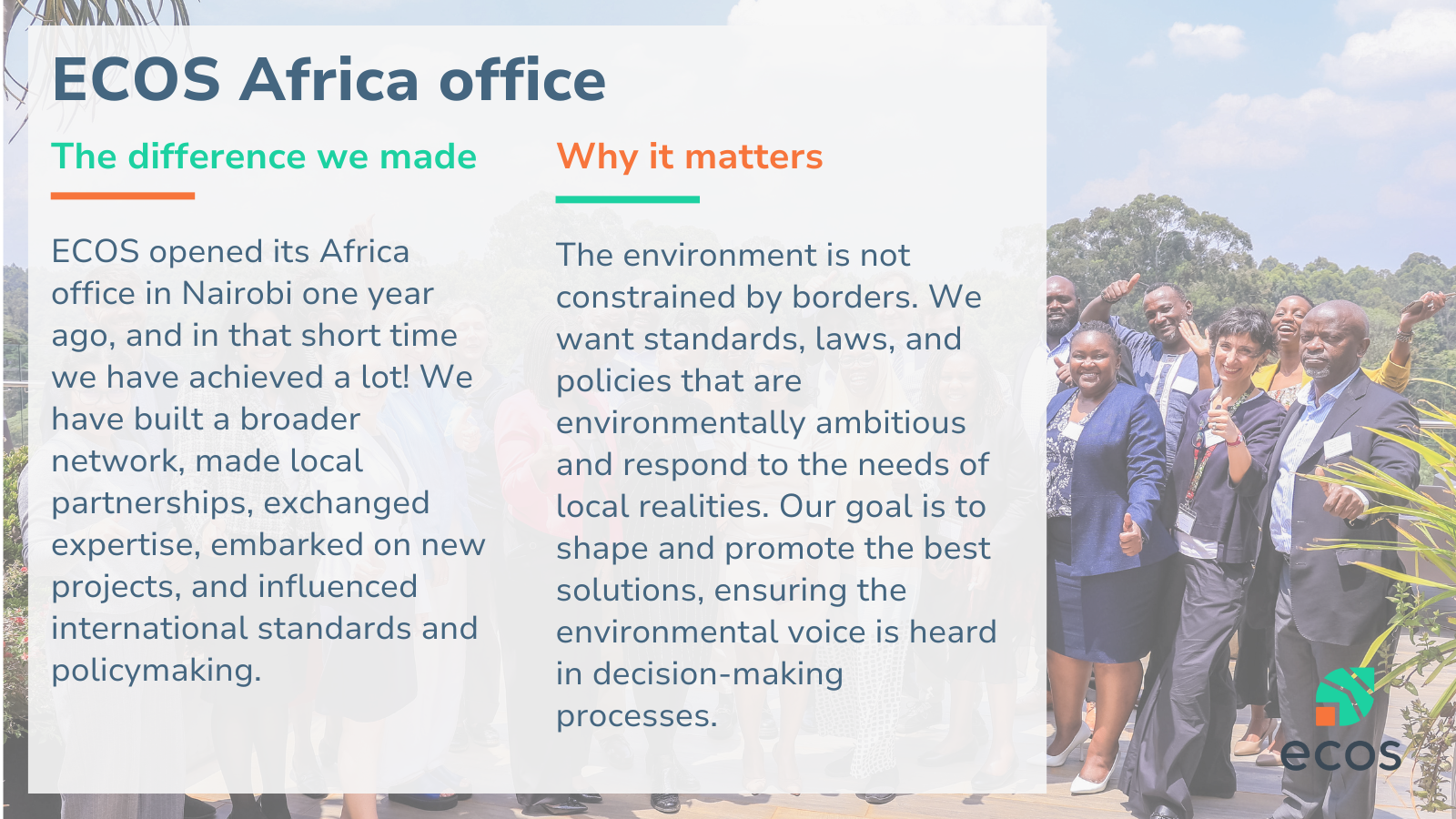One planet, one purpose: ECOS extends its global work
2024 began with ECOS opening a new office in Nairobi focusing on the African region. Be it international standards or the global Plastics Treaty, we have long worked on topics with a global environmental impact, but opening an Africa office was our first official step towards a truly global presence — and what a year it has been!

The environment is not constrained by borders, and neither is ECOS. Our goal is to shape and promote the best solutions to multifaceted environmental issues, ensuring the environmental voice is heard in the decision-making processes. That requires having priorities that make sense for different geographies and contexts, working with local experts, and using the right tools at the right times — whether that’s standards, laws, or policies.
How have we put our global vision into practice this year?
ECOS Africa: The impacts
We want to see standards, laws and policies that are environmentally ambitious and respond to the needs of local realities. To achieve this, we are making partnerships, exchanging information, and sharing our technical expertise with a wide network of allies from our Africa office in collaboration with the ECOS headquarters in Brussels.
The ECOS Africa office is only one year old, but it has had impacts already, such as:
Initiating new projects
Under the auspices of our Africa office, ECOS kicked off two new projects in 2024 — one on plastic pollution (in partnership with UNCTAD), which culminated with a successful workshop in Nairobi, and another on textile waste (in partnership with GIZ). The latter will continue into 2025, engaging with local stakeholders in the textiles and second-hand clothes value chain – stay tuned!
We have also been focusing on other topics with high relevance to the African region. For example, clean cooking and chemicals.
Influencing international policymaking
ECOS is an accredited observer of United Nations Environment Programme (UNEP) processes, meaning that we contribute our technical expertise to UN resolutions and agreements under UNEP. This year, for example, through our Africa office, we attended the sixth session of the UN Environment Assembly (UNEA-6), where we gave input to a number of draft resolutions, contributing to shaping the global environmental agenda.
From our headquarters in Brussels and our office in Nairobi, ECOS will continue to advocate stronger environmental ambition, exploring opportunities to influence future environmental policy at UNEA through collaboration with like-minded organisations.
Building a broader network & creating new partnerships
ECOS also welcomed a new member from Cameroon, ACDESPE, the Association Camerounaise pour le Développement, l’Entraide Sociale et la Protection de l’Environnement. In addition, we formalised collaboration with new experts based in the African region, kicking off an Africa environmental expertise hub.
To top it off, in two important milestones, we signed Memorandums of Understanding with:
- the African Organisation for Standardisation (ARSO) and
- the East African Centre of Excellence on Renewable Energy and Efficiency (EACREEE) to facilitate closer collaboration.
Through these partnerships, we want to strengthen environmental ambition and civil society participation in standards and policymaking.
Finally, we have joined key alliances working to address environmental challenges in Africa, including the Global eCooking Coalition (GeCCo), the International Pollutants Elimination Network (IPEN), the Regional East African Clean Cooking Network, and the Africa-Europe Joint Civil Society Engagement Mechanism (CSEM)
Sharing our expertise
This year, ECOS contributed to various events focusing on the African region, including speaking at a webinar on circularity by the African Circular Economy Network and the International Telecommunication Union’s Symposium on ICT, where we are also a member of the development sector study group.
We also hosted our first workshop in Africa (as part of our work on plastic pollution), where we exchanged with representatives from the United Nations Conference on Trade and Development (UNCTAD), local environmental NGOs, environmental management authorities, ISO, Africa Legal Network, Kenya (ALN), and standards developers from Kenya, Ghana, and Nigeria.
What’s in store for next year?
With all this achieved in only 12 months, we are excited for what the future holds — in Africa and beyond. In 2025, we aim to build on the knowledge and partnerships we have made to have (even) more impact.
We look forward to seizing the opportunities that 2025 will bring.


